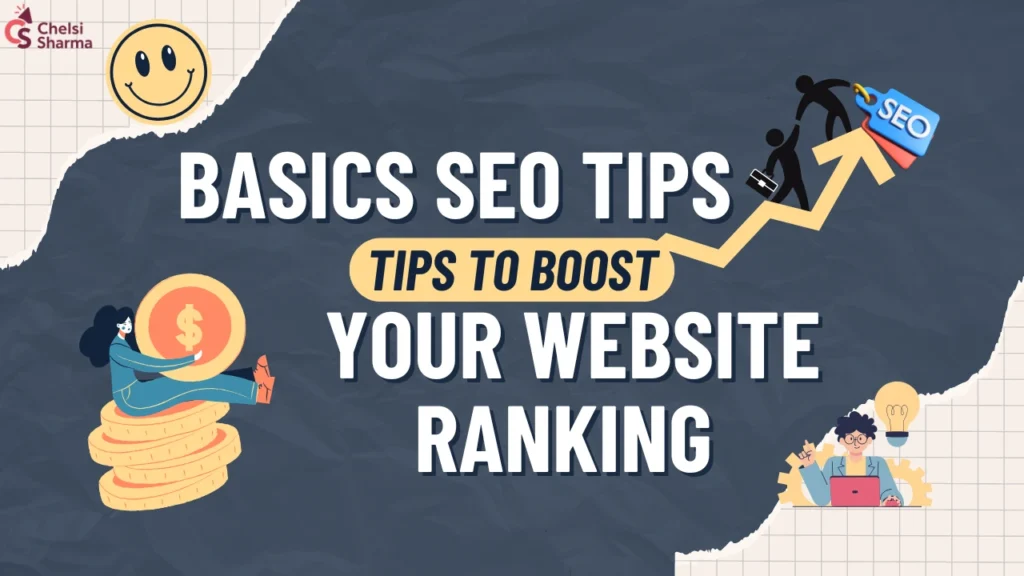
In today’s digital-first world, having a website is not enough. What matters more is how easily your website can be found online. That’s where SEO (Search Engine Optimization) comes into play. Whether you’re a business owner, blogger, or freelancer, understanding basic SEO tips to boost your website ranking is the first step to getting more visibility, attracting organic traffic, and growing online. This blog is your complete beginner-friendly guide to SEO — fresh, practical, and tailored for real results.
What is SEO and Why Does it Matter?
SEO stands for Search Engine Optimization — a set of strategies and practices designed to improve the visibility of a website on search engines like Google, Bing, and Yahoo. The higher you rank on search results, the more likely people will visit your site.
Quick Fact:
- Over 93% of online experiences begin with a search engine (Source: BrightEdge)
Why Should You Care?
- Free traffic: SEO brings organic visitors to your site without spending on ads.
- Trust and credibility: Top-ranked sites are seen as more trustworthy.
- Long-term results: Unlike paid ads, SEO keeps working overtime.
Key SEO Components to Boost Website Ranking
To understand SEO deeply, you need to know its three core pillars:
- On-Page SEO – Things you do on your website (keywords, content, structure)
- Off-Page SEO – External efforts like backlinks and social signals
- Technical SEO – Backend structure, like website speed, indexing, and mobile-friendliness
Let’s explore each of them in depth.
On-Page SEO Tips to Improve Ranking
1. Keyword Research: The Heart of SEO
Before writing content, you must know what your audience is searching for. Use tools like:
- Google Keyword Planner
- Ubersuggest
- Answer the Public
Focus on:
- Long-tail keywords (e.g., “best vegan skincare products for oily skin”)
- Search intent (Informational, Navigational, Transactional)
Pro Tip: Use tools like “Google Autocomplete” or “People Also Ask” to find keyword ideas.
2. High-Quality Content Creation
Content is the king, but user-focused content is the emperor. Ensure:
- Content solves a problem
- It’s easy to read (short paragraphs, bullet points)
- Includes media (images, videos, infographics)
Content Structure Example:
- Title Tag (H1)
- H2 Headings (Sub-topics)
- H3 or H4 for deeper sections
- Include keywords naturally, not forcefully
3. Meta Tags Optimization
- Title Tags: Keep under 60 characters, add keyword
- Meta Descriptions: Under 160 characters, include a CTA
4. Internal Linking
Link to other relevant pages on your site to help Google crawl and understand your content better.
5. Image SEO
- Compress images (use WebP format)
- Add ALT text with relevant keywords
- Use descriptive filenames (e.g., digital-marketing-strategy.jpg)
Off-Page SEO Tips to Increase Authority
1. Backlink Building
Backlinks are like votes of confidence. To get quality backlinks:
- Write guest posts
- Reach out to bloggers
- Create share-worthy content
2. Social Media Signals
Even though not a direct ranking factor, social shares improve visibility and bring traffic.
3. Online Directories and Citations
Register your business on:
- Google My Business
- Yelp
- JustDial
Ensure NAP (Name, Address, Phone) consistency across platforms.
Technical SEO Essentials
1. Mobile-Friendliness
Google uses mobile-first indexing. Make sure your site:
- Uses responsive design
- Has readable text
- Doesn’t use intrusive popups
2. Site Speed
Use tools like Google PageSpeed Insights or GTmetrix. To improve speed:
- Compress images
- Use caching
- Minify CSS and JavaScript
3. Secure Your Site
Switch from HTTP to HTTPS — it’s a ranking factor and builds trust.
4. XML Sitemap and Robots.txt
Submit your sitemap to Google Search Console. Ensure robots.txt doesn’t block important pages.
5. Structured Data (Schema Markup)
Add schema to improve CTR and appear as rich results (FAQs, reviews, ratings).
Fresh SEO Strategies
The SEO world is changing. Here are some updated tactics you must adopt:
1. Optimize for Voice Search
Use conversational keywords like “how to”, “what is”, “best way to”.
2. E-E-A-T Principle
Google evaluates content based on:
- Experience
- Expertise
- Authoritativeness
- Trustworthiness
Showcase author bios, credentials, and user testimonials.
3. Core Web Vitals
Focus on:
- Largest Contentful Paint (LCP)
- First Input Delay (FID)
- Cumulative Layout Shift (CLS)
4. Video SEO
Embed YouTube videos, optimize title and description, and add captions.
Track Your SEO Progress
Use tools to track and analyze performance:
- Google Search Console – For indexing and keyword insights
- Google Analytics – Understand user behavior
- Ahrefs / SEMrush – Keyword and backlink tracking
Sample Chart: Organic Traffic Growth Over 6 Months
| Month | Visitors |
|---|---|
| Jan 2025 | 320 |
| Feb 2025 | 610 |
| Mar 2025 | 890 |
| Apr 2025 | 1220 |
| May 2025 | 1560 |
| June 2025 | 2010 |
(This chart is based on a real SEO growth plan using these strategies)
Common SEO Mistakes to Avoid
- Keyword stuffing
- Ignoring mobile optimization
- Not updating old content
- Using duplicate content
- Neglecting technical SEO
Conclusion
SEO might sound technical, but at its core, it’s about creating value for users and helping search engines understand that value. With consistency, patience, and the above strategies, you can significantly boost your website’s visibility.
Remember, good SEO is not a trick — it’s a long-term investment.
“Don’t optimize for search engines. Optimize for people who use search engines.”
If you’re ready to grow your website traffic organically, start with these simple yet powerful SEO tips and watch your online presence transform.
FAQs
ABOUT THE AUTHOR
Chelsi Sharma is a passionate digital marketing trainee and founder of chelsisharma.com, where she helps businesses grow through smart, ethical, and result-driven marketing strategies. With a strong focus on SEO, content marketing, and social media, Chelsi combines creativity with analytics to create impactful online experiences. Her mission is to make digital marketing simple, accessible, and effective for everyone—from solo entrepreneurs to growing brands. When she’s not optimizing websites, she’s exploring the latest marketing trends, writing helpful content, or assisting clients in building a powerful digital presence.
Connect with Chelsi on LinkedIn or explore more guides and services on her website.

